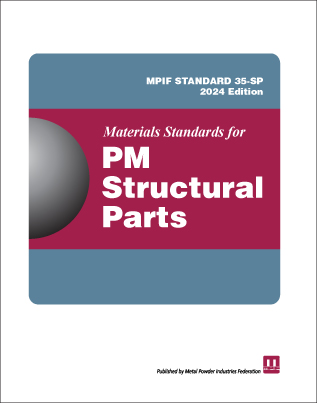 Developed by the commercial PM parts manufacturing industry, this standard is a must for structural PM parts designers and engineers.
Developed by the commercial PM parts manufacturing industry, this standard is a must for structural PM parts designers and engineers.
Summary of Changes (pdf) Buy
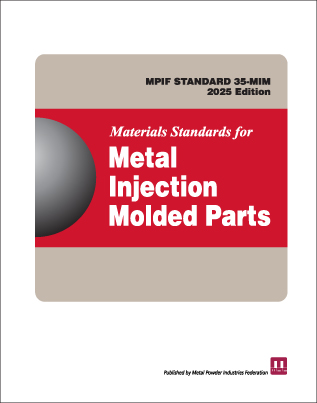 This standard covers the most common materials used in metal injection molding, with explanatory notes and definitions.
This standard covers the most common materials used in metal injection molding, with explanatory notes and definitions.
Summary of Changes (pdf) Buy
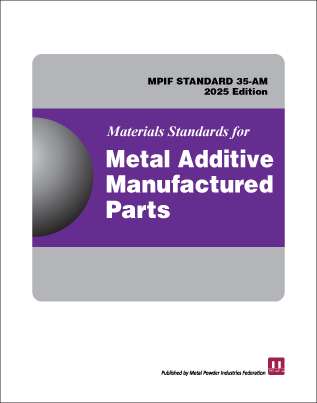 The latest engineering property data and information available in order to specify materials for components made by the metal AM process.
The latest engineering property data and information available in order to specify materials for components made by the metal AM process.
Buy
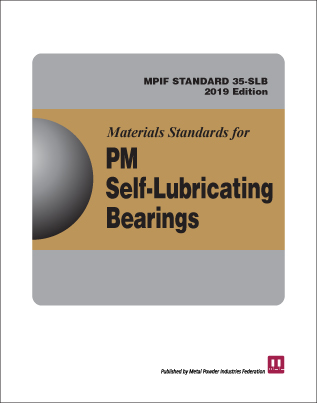 Includes helpful engineering information on typical loads, recommended press fits, and running clearances for common bearings.
Includes helpful engineering information on typical loads, recommended press fits, and running clearances for common bearings.
Summary of Changes (pdf) Buy
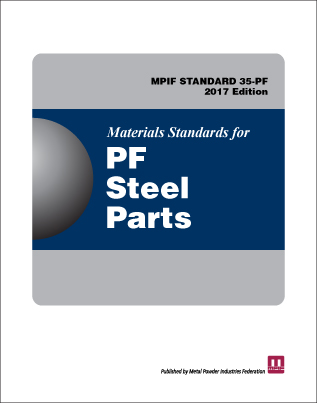 The most up-to-date information available on powder forged steel components, providing the latest specifications for PF materials.
The most up-to-date information available on powder forged steel components, providing the latest specifications for PF materials.
Summary of Changes (pdf) Buy
Methods of Test
The Standard Test Methods for Metal Powders and Powder Metallurgy Products has been developed to provide guidance for PM technology users and suppliers. They have been adopted in cooperation with member trade associations through committees comprised of technical experts responsible for developing standards within their areas of expertise and proposing them to the MPIF membership.
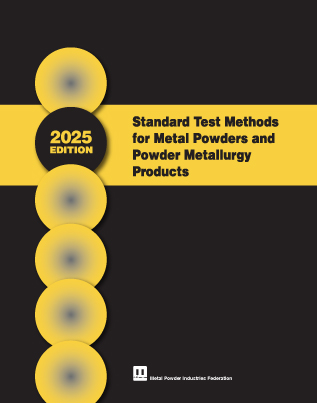 The latest test methods for metal powders and powder metallurgy products, providing guidance to users and suppliers
The latest test methods for metal powders and powder metallurgy products, providing guidance to users and suppliers
Summary of Changes (pdf) Buy
MPIF Standards Test Methods Videos 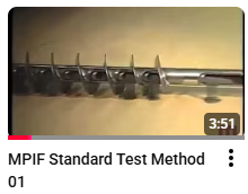

If you need a refresher or to
learn how a test method is
performed, visit:
youtube.com/@MPIFVideos
MPIF Standard 56, Determination of Rotating Beam Fatigue Properties of Powder Metallurgy (PM) Materials –excel worksheet for Table 1
Staircase Fatigue Calculator
Artificial Intelligence (AI) Policy: The Metal Powder Industries Federation (MPIF) prohibits the entry of MPIF standards and related intellectual property ("MPIF IP") into any form of AI tools, such as ChatGPT. Creating derivatives of MPIF IP using AI is also prohibited without express written permission from MPIF's Executive Directors/CEO. In the case of such use, MPIF will suspend a licensee's access to MPIF IP, and further legal action will be considered.
The primary objective to this standard is to eliminate injuries associated with presses used in the PM industry by establishing safety requirements.
Buy
The American National Standard for Machine Tools—Metal Powder Compacting Presses:
Safety Requirements for Construction Care and Use was prepared in conjunction with
MPIF and the B11.16 subcommittee of ANSI. The standard was developed to eliminate
injuries to personnel associated with presses used in powder metallurgy, by
establishing safety requirements for the construction, safeguarding, care and use of PM presses.
Note: The use of any MPIF standard is entirely voluntary. Existence of an MPIF standard does not in any respect preclude any member of MPIF or non-members from manufacturing or selling products not included in the standards. Suppliers are at liberty to supply products or to use procedures other than those identified in any standard.
Members: To receive the discount code, log in to the MPIF or APMI International websites.
Analytical Strength Assessment of Components Made of Sintered Steels
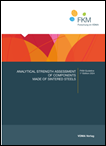 Herausgeber FKM
Herausgeber FKM
The FKM Guideline “Analytical Strength Assessment of Components Made of Sintered Steels” is the first publicly available, engineer ready design rule dedicated to pressed and sintered steels. It is fully aligned with the established FKM framework for local, elastic stress assessment. It closes a long-standing gap: while wrought and cast steels are well covered, powder metallurgy (PM) components have lacked a coherent, validated assessment method.
The guideline enables reliable static and fatigue verification using only two material inputs: Vickers hardness (HV10) and density. From these values, all necessary properties and influence factors are derived so that the degree of utilization for static and fatigue strength can be evaluated. In addition to hardness and density, the method requires only a linear elastic finite element analysis to obtain local principal or von Mises stresses and their distribution.
The assessment approach is grounded in an exceptional database – over 22,000 fatigue data points and 64 × 2 static tests – covering 12 widely used sintered steel families and 35 specimen geometries. This breadth supports confident application across typical hardness and density ranges and complex local stress states.
Engineers benefit from minimal inputs, fast FE based workflows, reduced testing effort, and consistent, traceable decisions. The guideline is ideal for automotive and machinery applications, integrates seamlessly with existing CAE processes, and helps avoid overdesign while safeguarding durability. In short, it turns PM component design into a data guided, efficient, and robust process.
Purchase from VDMA